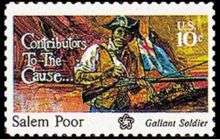Salem Poor

Salem Poor (1747–1802) was an African-American slave who purchased his freedom, became a soldier, and rose to fame as a war hero during the American Revolutionary War.
Early life
Poor was born in 1747 into slavery on a farm in Andover, Massachusetts owned by John Poor and his son John Poor Jr.[1] He bought his freedom on July 10, 1769 from John Poor Jr. for £27, a year's salary for an average working man at the time.[1][2] Before joining the Revolutionary Army in 1775, Poor lived in Andover with his wife, Nancy, a free African American woman, and their son.[3]
Military career
In May 1775, Poor enlisted in the militia, serving under Captain Benjamin Ames in Colonel James Frye's regiment, opposing the British troops occupying besieged Boston. He is best remembered today for his actions during the Battle of Bunker Hill on June 17, 1775, where he is credited with mortally wounding British Lieutenant Colonel James Abercrombie.[1][2]
Poor's valor and gallantry at the Battle of Bunker Hill prompted 14 officers, including Colonel William Prescott, to cite him for heroism and petition the General Court of Massachusetts with the following statement:
The Reward due to so great and Distinguished a Character. The Subscribers beg leave to Report to your Honorable. House (Which We do in justice to the Character of so Brave a man) that under Our Own observation, we declare that A Negro Man Called Salem Poor of Col. Fryes Regiment, Capt. Ames. Company in the late Battle of Charleston, behaved like an Experienced Officer, as Well as an Excellent Soldier, to Set forth Particulars of his Conduct would be Tedious, We Would Only beg leave to say in the Person of this Negro Centers a Brave & gallant Soldier.[4]
On July 10, 1775, George Washington ended the recruitment of African Americans.[1] On November 12, he issued orders prohibiting all black men from serving in the Continental Army. (Despite the ban on recruitment, those who had already been serving for some time were allowed to stay until this point.) On hearing of this, Lord Dunmore, who at the time was Governor of Virginia, offered freedom to all slaves willing to serve with the British. Washington, sensing the disaster that would almost surely result, immediately changed his position, at once ordering all recruiters to enlist any black men who wanted to fight.[5]
Poor immediately re-enlisted in the militia and fought with the Patriot forces until March 20, 1780, when he was apparently discharged. He is known to have retreated to the winter camp at Valley Forge and fought in the Battle of White Plains.[1]
Personal life
In August 1771, Poor married Nancy Parker, "a half breed Indian servant in the family of Capt. James Parker", according to papers in the Charlotte Helen Abbot Collection of the Andover Historical Society; they had a son, Jonas, who was baptized on September 29, 1776.[1] In 1780, he married his second wife, Mary Twing, a free African American. The couple moved to Providence; however, they were ordered to leave that city, presumably because they could not support themselves.[6] In 1785, he placed an advertisement in the Boston Gazette to disown Mary's debts and "forewarn all Persons from trusting MARY, the Wife of the Subscriber".[6] Poor then married Sarah Stevens, a white woman, in 1787, and in 1793 he spent several weeks in the Boston Almshouse.[6] He was briefly jailed for "breach of peace" in 1799, married for the fourth and final time in 1801, and died in 1802.[6] Details of his life after the Revolutionary War were not widely known until research by genealogist David Lambert, a descendant of Poor's former owners; an article about this research appeared in The Boston Globe in 2007.[6]
Honors
In 1975, Poor was honored with a stamp in the "Contributors to the Cause" series commemorating the United States Bicentennial.[1] Poor Street in Andover was named after him.
References
- 1 2 3 4 5 6 7 Carney Smith, Jessie, ed. (1998). "Salem Poor". Notable Black American Men, Book II. Detroit: Gale. Retrieved January 29, 2013.
- 1 2 "Salem Poor". National Park Service. Retrieved January 29, 2013.
- ↑ Finkelman, Paul (2006). Encyclopedia of African American History 1619–1895: From the Colonial Period to the Age of Frederick Douglass. New York: Oxford University Press. pp. 526–527. ISBN 978-0-19-516777-1.
- ↑ "Salem Poor, an original patriot!". African American Registry. Retrieved January 29, 2013.
- ↑ Selig, Robert. "African-Americans in the Continental Army and the State Militias During the American War of Independence". Museum of the American Revolution. Archived from the original on 3 February 2013. Retrieved January 29, 2013.
- 1 2 3 4 5 Sege, Irene (February 21, 2007). "Freed slave's story uncovered by owner's descendant". The Boston Globe. Retrieved January 29, 2013.
External links
 Quotations related to American Revolution at Wikiquote
Quotations related to American Revolution at Wikiquote